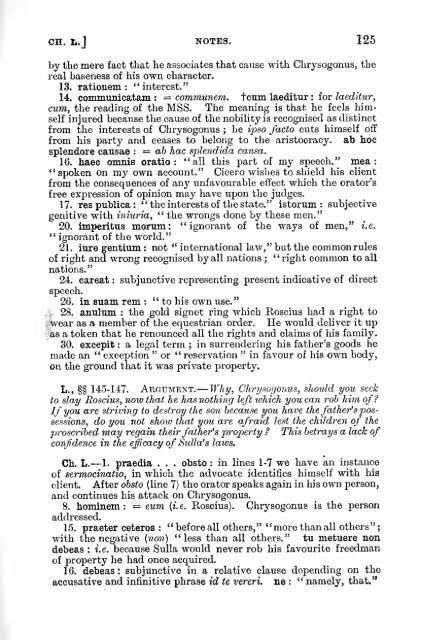Pro S. Roscio Amerino
Pro S. Roscio Amerino
Pro S. Roscio Amerino
You also want an ePaper? Increase the reach of your titles
YUMPU automatically turns print PDFs into web optimized ePapers that Google loves.
CH. t.J NOTBS. 125<br />
by the mere fact tliat lie associates that cause with Chrysogonus, the<br />
real baseness of his own character.<br />
13. rationem : "interest."<br />
14. communicatam : = communem. tcum laeditur : for laeditur,<br />
cum, the reading of the MSS. The meaning is that he feels himself<br />
injured because the cause of the nobility is recognised as distinct<br />
from the interests of Chrysogonus ; he ipso facto cuts himself off<br />
from his party and ceases to belong to the aristocracy. ab hoc<br />
splendore causae : = ah hac splendida causa.<br />
16. haec omnis oratio " : all this part of my speech." mea :<br />
"spoken on my own account." Cicero wishes to shield his client<br />
from the consequences of any unfavourable effect which the orator's<br />
free expression of opinion may have upon the judges.<br />
17. respublica: " the interests of the state." istorum : subjective<br />
genitive with iniuria, " the wrongs done by these men."<br />
20. imperitus morum: " ignorant of the ways of men," i.e.<br />
" ignorant of the world."<br />
21. iure gentium : not " international law," butthe commonrules<br />
'<br />
of right and wrong recognised by all nations ; ' right common to all<br />
nations."<br />
24. careat : subjunctive representing present indicative of direct<br />
speeeh.<br />
26. in suam rem " : to his own use."<br />
anulum : the gold signet ring which Roscius had a right to<br />
rear as a member of the equestrian order. He would deliver it up<br />
3 a token that he renounced all the rights and claims of his family.<br />
t28.<br />
30. excepit : a legal term ; in surrendering his father's goods he<br />
made an " exception " or " reservation " in favour of his o^vn body,<br />
on the ground that it was private property.<br />
L., §§ 145-147. Argument.— Why, Chnjsogonus, should you seeh<br />
to slay Rosciv^, now that he hasnothing left lohich youcan rob him of?<br />
If you are striving to destroy the son because you have thefather^spossessions,<br />
do you not show that you are afraid lest the children of the<br />
proscribed may regain theirfather's property ? This betrays a lack of<br />
confdence in the efficacy of Sidla's laivs.<br />
Ch. L.— 1. praedia . . . obsto : in lines 1-7 we have an instance<br />
of sermocinatio, in which the advocate identil5es himself witli his<br />
elient. After obsto (line 7) the orator speaks again in his own person,<br />
and continues his attack on Chrysogonus.<br />
8. hominem : =<br />
addrcssed.<br />
eum (i.e. Roscius). Chrysogonus is the person<br />
15. praeter ceteros : "beforeall others," "more thanall others";<br />
with the negative (non) " less than all others." tu metuere non<br />
debeas : i.e. because Sulla would never rob bis favourite freedman<br />
of property he had onee acquired.<br />
16. debeas : subjunctive in a relative clause depending on the<br />
accusative and infinitive phrase id te vereri. ne : " namely, that."

















